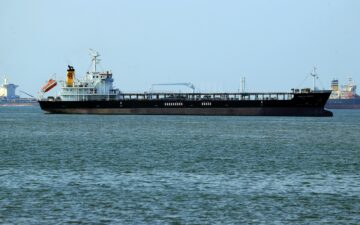By Mark J. Spalding — President, The Ocean Foundation
This week I am in Singapore at the World Oceans Summit hosted by The Economist. This Pacific location was chosen because this city-state began as a poor fishing village and now has become an economic powerhouse and center of trade. You just can’t miss the hundreds of ships from all over the world, sitting at anchor just outside its ports.
On my first day here, I had the opportunity to tour the sprawling new maritime museum and talk with my gracious hosts about the equally large aquarium next door that will open to the public soon. It is always interesting to see how different institutions strive to draw the fine line between attracting and educating the public about our ocean neighbors.
As a global business magazine, The Economist organized this conference, noting that not only do most people on the planet live near the ocean, but also the oceans are obsessively interesting. The Economist did a special report on our “Troubled Seas” in 2009. The editor in chief shared that never before have they hosted a meeting with this much interest, passion and interest. The Economist is a magazine originally founded to advocate for free trade. Thus, their starting point is the economic activity in and around the ocean, as well as how it will grow in the coming years. Among those activities are trade, transport, mining, tourism and bio-pharmaceuticals.
The 300-person attendee list is filled with ocean industry, academic and non-profit representatives. Sadly, there are few representatives from developing nations where some of the most cutting edge marine protection work is being undertaken and whose dependence on healthy coastal resources is significant. There are also relatively few government decision makers. But I take it as a good sign that I know only about 50 of the 300 people here. We will not be preaching to the choir in this meeting. It is always good to expand the network of people working on the ocean’s behalf. And, it would be foolish to fly halfway around the world to see only the ocean people I already know!
At this meeting are some of our fellow funders—Code Blue Foundation, the International Sustainable Seafood Foundation, Moore Foundation, Tiffany & Company Foundation, Walton Family Foundation, and the Waitt Foundation. Some TOF grantees are also here—Stanford University’s Hopkins Marine Station, Scripps Institution of Oceanography, RARE, and SeaWeb. Speakers include two members of our board of advisors, Sylvia Earle and Daniel Pauly. Some TOF alumni are also on the agenda: Steven Lutz (now with UNEP) and Linwood Pendleton (now with Duke University). In addition, one of the leaders of our High Seas Alliance, Kristina Gjerde is one of the speakers on an ocean governance panel.
We were welcomed by Singapore’s Deputy Prime Minister Teo Chee Hean, and heard inspirational remarks by Prince Charles and the President of Iceland. The first keynote by Dr. Sylvia Earle noted how much information we now have about the ocean that was unknown at the beginning of her career. In her view, this empowers us, and requires us to act on its behalf. When we combine it with intelligence and passion, we can find solutions. Each of the three speakers focused on the natural capital of the ocean, which we need to value in order to have sustainable economies.
Much of the content of morning panels offered familiar fare to those of us who work on oceans conservation day in and day out. Yet, many in the room were new to the issues of overfishing, pollution, habitat destruction and climate change and how they relate to the ocean. Additional speakers emphasized the value of and role of oceans in providing ecosystem services, such as coral reefs reducing harm from waves for island states. An emphasis was placed on treating the ocean as a partner. If we protect and restore her, the ocean’s resilience and productivity will work with us producing recovery at a very high rate of return.
Speakers emphasized that simplistic solutions like closing fisheries, or privatizing fishing rights just don’t work in the context of subsistence economies, where poverty is a part of the causation of overfishing and habitat destruction. For example, the President of Kiribati who spoke after lunch highlighted the internal challenges and debates around creating the Phoenix Islands Protected Area. This reserve is one of the largest in the world, but for the people of Kiribati, this global contribution effectively reduced the nation’s income from fishing licenses. This is a tough sell in a country where the per capita income hovers around US$1400 per year. Now, manganese and other metals have been discovered within PIPA, presenting a new challenge to a poor country’s commitment to protect its ocean. Fish were easy because they move and can be found at the edges of reserves as populations come back, but mining does not benefit from edge effects of MPAs.
Another panel focused on how blue companies can be more responsible for the care of the ocean. An argument was made that publicly traded companies should understand their risks (costs and supply chain) for raw materials, fuel, and commodities. In turn, this understanding creates an opportunity to reduce costs and secure supply—addressing risk is where sustainability starts.
The Economist timed this meeting to recognize the 30th Anniversary of the UN Convention on the Law of the Sea (UNCLOS). Singapore Ambassador at Large, Tommy Koh, who helped to bring the UNCLOS into being, spoke highly of the results 30 years later. He described how UNCLOS established the rule of law for our global oceans, a transparent and consistent structure, replacing chaos that existed before. In fact, it promotes peace by replacing militaristic responses and assertions of rights with a framework for agreement.
The final panel of the day examines the challenges and opportunities for opening the Arctic to shipping, oil exploration, mineral mining, fishing, and tourism. With only little discussion about preparing for the significant effects that an ice-free Arctic will have on global weather patterns (and thus, our existing patterns of trade, food production, and development), it is a little disturbing to see how all the economic interests are circling—eagerly anticipating when the ice to be gone. I suspect that that is not true of the ice-dependent human communities of people and their animal neighbors whose existence is at risk.
Tonight is a gala dinner hosted by National Geographic and then we have another full day tomorrow!






